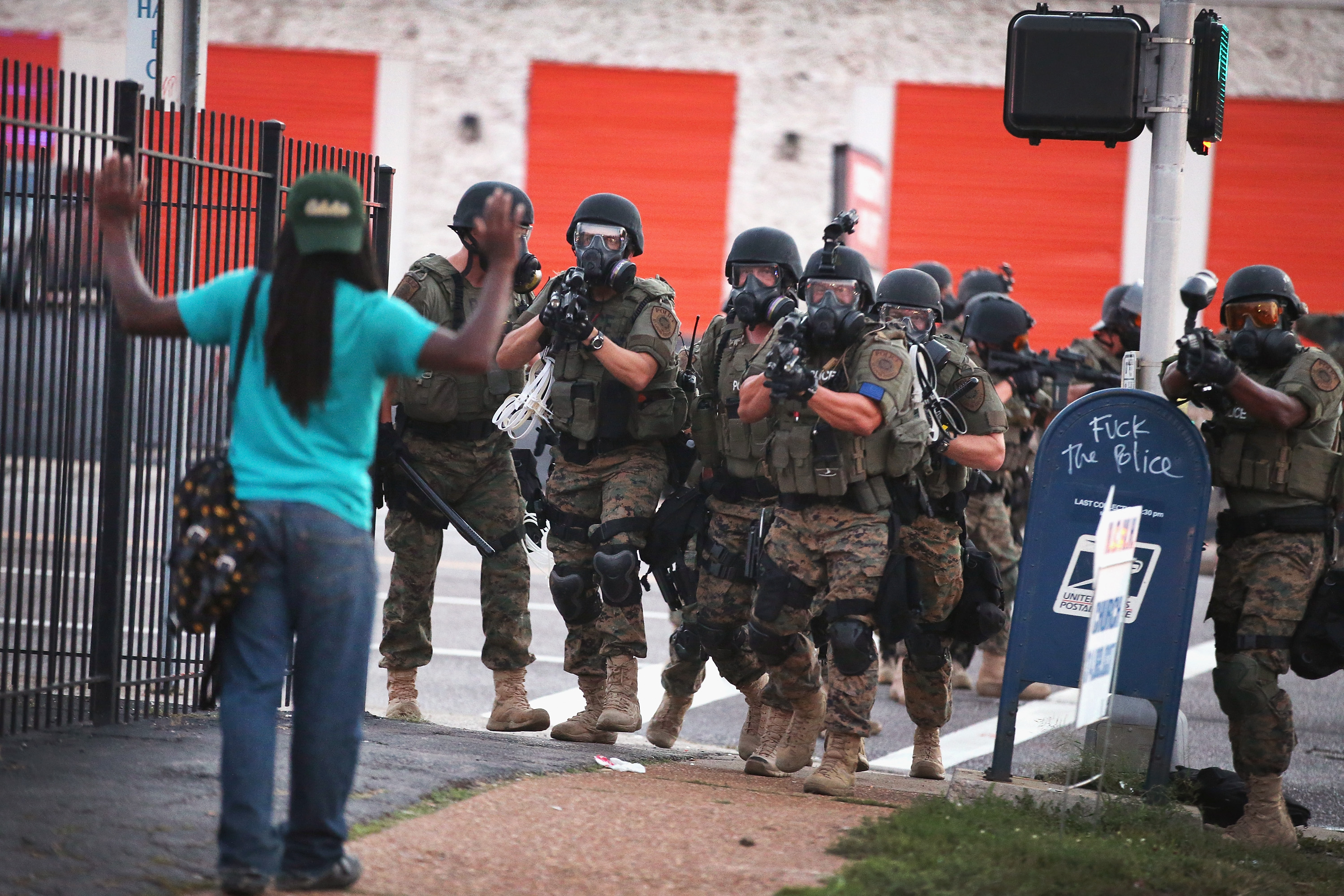How to fix the American cop
To stop murders, solve the ones that have already happened


After a decades-long steady decline, murder has jumped back to center stage in many American cities. Though the overall rate across the country showed only a minor increase, in several cities it is a genuine emergency. Chicago had 762 murders in 2016, an increase of over 50 percent in one year. Baltimore had 318, off slightly from 2015 but still 50 percent more than 2014. This raises two obvious questions. What is driving the murders, and how might it be stopped?
It's a good opportunity to read Jill Leovy's Ghettoside, an extraordinarily good work on murder in the modern American city. It advances a deceptively simple thesis: To stop homicide, police should solve the ones that happen.
Let me address causes first. There is a very strong case that the immense crime wave of the late-middle 20th century was caused by heavy metal poisoning from leaded paint and gasoline. But there is no such obvious environmental factor this time — the increases are too fast and too localized.
The Week
Escape your echo chamber. Get the facts behind the news, plus analysis from multiple perspectives.

Sign up for The Week's Free Newsletters
From our morning news briefing to a weekly Good News Newsletter, get the best of The Week delivered directly to your inbox.
From our morning news briefing to a weekly Good News Newsletter, get the best of The Week delivered directly to your inbox.
Instead, though one must be cautious at this early stage, it appears to be a problem with the police, who have sharply cut back on work in many cities. A recent 60 Minutes report in Chicago detailed a near-collapse of investigative effort, and Baltimore has been struggling with police recruitment since 2015.
Conservatives and police unions point to this as the so-called "Ferguson effect," or what happens when liberals disrespect the police — meaning things like "getting mad when cops are constantly shooting unarmed people to death." By this view, the cops can do nothing wrong, and they deserve constant deference no matter who they strangle, batter to death, or gun down.
This is a crock. But it would also be a mistake to say that the police brutality protests led by Black Lives Matter and today's murder problem are totally unrelated. BLM is not responsible for the murder increase, but it reflects one aspect of why the police are not doing their jobs properly.
This is where Ghettoside comes in. Leovy persuasively argues that the spectacular murder problem in the American black community is a failure of state-building. The most basic function of the state is to enforce a monopoly on violence, and the single most important task in that effort is ensuring that violent crime is punished. Murder is the king of crimes, and if the state cannot be relied upon to find and punish the culprits, then people will take matters into their own hands.
A free daily email with the biggest news stories of the day – and the best features from TheWeek.com
This was the case in the Appalachian backwoods years ago where rival clans would get into horrifically bloody, decades-long feuds, and it is the case in many African-American communities today. Clans and gangs are not the product of "bad culture" or other such anxious liberal notions. They are the product of the basic human desire for safety and justice manifested in an area of state weakness — indeed, they might well be considered a sort of broken, horrible proto-state.
The responsibility for murder falls to police homicide investigators. But as Leovy demonstrates, American police are not great at this task. It's not due to a failure of talent — the detective Leovy follows, John Skaggs, is cocksure but extraordinarily effective — but due to the structure of American police departments. Homicide work is challenging, extremely resource-intensive, and not much amenable to the sort of Taylorism that is in vogue among the upper-class liberals who design policy for large cities.
Good homicide work is a craft. It requires someone with organization and discipline, a powerful work ethic, and excellent people skills. It means careful management of evidence, backed up by a trained forensic team; interviewing tens or hundreds of sources, often going back again and again and again to wheedle someone into talking; placing witnesses in protected locations to convince them to testify; and great skill in psychological manipulation to convince suspects to confess. This is poles apart from simply beating false confessions out of someone, of course; one of the most remarkable parts of the book recounts Skaggs' coaxing a confession out of a guilty suspect with nothing but some off-putting friendly banter and a few well-chosen lies.
Modern police departments are not a friendly place for the craftsman. Department budgets are strangled in the age of austerity, and the brass are constantly possessed by faddish ideas about preventative policing like "broken windows" and "stop-and-frisk" that can be quantified down to the pencil stroke. Grueling, uncertain detective work does not have that Big Data shine, and even a moderately complicated case can rack up tremendous bills before it is remotely close to going to court, with no guarantee that it will lead to a conviction.
Skaggs and his comrades make a good living at detective work, but they struggle constantly for department resources and professional recognition — what success they have is more in spite of the department structure than because of it. Worse still, the beloved Big Data projects often involve flooding troubled areas with patrolmen who do little more than stand around and hassle people, leading to the occasional beating or killing, and creating tremendous resentment of the police.
That structural incompetence is colliding head on with a popular uprising against police brutality to create a crisis of legitimacy for American police in cities like Chicago and Baltimore, both of which had brutal, high-profile police killings. People are outraged and often refuse to cooperate with investigators, police morale is low, and more than a few cops appear to think that a huge increase in murders is just deserts for failing to respect the police. Result: a spree of murders. As Leovy emphasizes, it is precisely because police are generally apathetic about a certain class of homicides — namely, those of black men — that so many happen.
The solution is as obvious as it is difficult — reform police departments to solve murders. First, restore the reputation of police. Punish abusive cops, and drastically cut back mass harassment tactics, like stop-and-frisk, that solve nothing except soothing upper-class liberals' neurotic need for large spreadsheets. Patrolmen and beat cops have important roles to play in investigation (and in policing generally), but "constantly jacking up tens of thousands of innocent people" is not among them.
On the other hand, make homicide detectives the crown jewel of the police — recruit the best investigators and shower them with resources and status, then demand dogged, ethical effort and solved cases. As Leovy writes, homicide work is extraordinarily compelling for someone with a talent for it. It quite literally is a foundation of American society. Given a reasonable context and proper support, the work will be done well.
Ryan Cooper is a national correspondent at TheWeek.com. His work has appeared in the Washington Monthly, The New Republic, and the Washington Post.
-
 ‘Let 2026 be a year of reckoning’
‘Let 2026 be a year of reckoning’Instant Opinion Opinion, comment and editorials of the day
-
 Why is Iran facing its biggest protests in years?
Why is Iran facing its biggest protests in years?TODAY’S BIG QUESTION Iranians are taking to the streets as a growing movement of civic unrest threatens a fragile stability
-
 How prediction markets have spread to politics
How prediction markets have spread to politicsThe explainer Everything’s a gamble
-
 'Once the best in the Middle East,' Beirut hospital pleads for fuel as it faces shutdown
'Once the best in the Middle East,' Beirut hospital pleads for fuel as it faces shutdownSpeed Read
-
 Israeli airstrikes kill senior Hamas figures
Israeli airstrikes kill senior Hamas figuresSpeed Read
-
 An anti-vax conspiracy theory is apparently making anti-maskers consider masking up, social distancing
An anti-vax conspiracy theory is apparently making anti-maskers consider masking up, social distancingSpeed Read
-
 Fighting between Israel and Hamas intensifies, with dozens dead
Fighting between Israel and Hamas intensifies, with dozens deadSpeed Read
-
 United States shares 'serious concerns' with Israel over planned evictions
United States shares 'serious concerns' with Israel over planned evictionsSpeed Read
-
 Police raid in Rio de Janeiro favela leaves at least 25 dead
Police raid in Rio de Janeiro favela leaves at least 25 deadSpeed Read
-
 Derek Chauvin's attorney files motion for new trial
Derek Chauvin's attorney files motion for new trialSpeed Read
-
 At least 20 dead after Mexico City commuter train splits in overpass collapse
At least 20 dead after Mexico City commuter train splits in overpass collapseSpeed Read
